#and coverage on how CEOs are protecting themselves
Explore tagged Tumblr posts
Text
so weird and disturbing to be living with people who watch mainstream media again. just constantly disturbed by the propaganda and the defense of rapists, so casually
#and talking about a school shooting like it’s no big deal because it happens all the time#making the kids recount the experience#we need to make sure our kids all know how to call 911!#but not try to stop people from getting guns#that would be overstretching#/s#and coverage on how CEOs are protecting themselves#and the grandparent talking abt how she’s counting down the days until jan 20 so ‘trump can get rid of the criminals’
3 notes
·
View notes
Text
Judd Legum at Popular Information:
Donald Trump, the former president and current Republican nominee, is now a convicted felon. In the aftermath of the verdict, Trump predictably complained that the trial was "rigged." This was not particularly surprising. Trump has also claimed the 2020 election, federal employment statistics, election polls, the January 6 Committee, the media, social media companies, search results, his impeachment hearing, the Pulitzer Prize, and the Emmys were "rigged." But, in the aftermath of the verdict, some pundits and politicians have advanced numerous arguments suggesting that Trump's convictions were illegitimate, unfair, or inconsequential. Today's Popular Information critically examines each of these arguments.
The charges against Trump were "obscure" and "nearly entirely unprecedented."
One of the most common criticisms of Trump's felony convictions is the convictions are illegitimate because similar charges have not been brought against others. Elie Honig, a former federal prosecutor and current CNN commentator, argued in a column that prosecutors "contorted the law in an unprecedented manner in their quest to snare their prey." As Honig acknowledges, at the most basic level, this is not true. Trump was convicted of falsifying business records in the first degree. That charge, which is a felony, involves falsifying the records with the intent to commit or conceal another crime. A March 2023 analysis by Just Security found that prosecuting the falsification of business records in the first degree is "commonplace" in the New York District Attorney's office and used "to hold to account a breadth of criminal behavior from the more petty and simple to the more serious and highly organized." The analysis summarized the dozens of similar prosecutions in a 24-page document.
[...]
The charges against Trump were not important
In New York Magazine, Jonathan Chait argued that Trump's convictions "did not represent his worst crimes" and that the charges themselves were "marginal." Similar arguments have been made by many other commentators. The charges against Trump stemmed from a conspiracy to conceal information from the public in the critical days before the 2016 election. Especially after the leak of the Access Hollywood tape, in which Trump brags about sexually assaulting women, Trump's moral character was at issue. News that he had allegedly had an affair with an adult film star would have been a major story. At a minimum, it would have diverted attention from Hillary Clinton's email usage, which dominated coverage in the closing days of the campaign. It's unclear how much of an impact Stormy Daniels story would have had on the electorate. But it wouldn't have had to do much to change the course of history. A shift of 80,000 votes across a handful of states would have tipped the balance to Hillary Clinton.
[...]
There was nothing unlawful about how Trump tried to influence the election
Brad Smith, a former FEC commissioner, argued that the payments to Daniels did not violate federal campaign finance law because the money could be considered a personal expense, not a campaign expense. In making this argument, he ignores testimony from former AMI CEO David Pecker that there was an agreement to make these kinds of payments to protect Trump's campaign. But there is a bigger problem with Smith's argument. The prosecution did not just argue that the payments to Daniels violated campaign finance law. They also argued that the money paid to former Playmate Karen McDougal violated campaign finance law and was part of the same conspiracy. And that money was not paid by Cohen, it was paid by AMI. If this was a personal expense why would it be paid by a corporation and never reimbursed? Smith does not address the payment to McDougal at all.
[...]
The jury was hopelessly biased against Trump
Congressman Nick Langworthy (R-NY) said that Trump was convicted not by a "jury of his peers" but a "jury of adversaries." He said prosecutors "found the venue" where Trump "couldn’t win." Trump was tried in Manhattan because that is where he chose to live at the time. It was also the locus of his crimes. And there is evidence suggesting that one or more of the jurors was politically conservative. According to the court questionnaires, one of the jurors who was selected said they relied on Truth Social, Trump's own social network, and X, which has taken a sharp rightward turn under Elon Musk, for news. Another juror reported regularly watching Fox News and MSNBC. And according to reporting, one juror said that "he believed Mr. Trump had done some good for the country." Another juror found himself "agreeing with some Trump administration policies and disagreeing with others." A third juror said she appreciated that "President Trump speaks his mind." To avoid conviction, Trump's legal team needed only to convince a single juror. All of the jurors voted to convict Trump on all 34 counts.
Popular Information has a solid article debunking the right-wing spin on the Trump business records falsification trial verdict that made Donald Trump a 34x convicted felon.
#Donald Trump#People of New York v. Trump#Donald Trump Trial#Stormy Daniels#Stormy Daniels/Donald Trump Affair#David Pecker#Karen McDougal/Donald Trump Affair#Karen McDougal#Michael Cohen#American Media Inc.
16 notes
·
View notes
Text
I saw a take on Tumblr recently that really resonated with me and I wanted to take a bit of time and explore it. Anyone ready for a LONG RANT (TM)? (TL;DR: at the bottom)
INTRODUCTION
The alleged killing of Brian Thompson by Luigi Mangione has been in the news a lot recently, I'm sure you haven't missed it, and one of the interesting things to note has been the disconnect between the universal reporting of the event in a negative light and the fact that a significant minority of the American public, over 15% in a recent poll, find it to be acceptable or are at least as concerned about Thompson's actions as they are about Mangione's alleged actions. For the record, that 15% is still less than the number of Americans who believe that they will have to resort to violence to resolve political issues, yet we haven't seen the same level of sustained, negative coverage of that issue. One might say, "oh, but we haven't seen any specific acts of political violence", but, of course, we have; two people attempted to shoot president-elect Trump during his candidacy this year, Trump himself incited a mob of his supporters to storm the US Capitol less than four years ago, vigilantes like George Zimmerman, Kyle Rittenhouse, and Daniel Penny have been killing "suspicious" or "unruly" people in public for years, and, of course, the recent killing of UHC CEO Brian Thompson was, itself, an act of political violence.
This brings me to the take I read recently, which made the interesting point that this particular killing and the way it has been covered brings together both left-wing and right-wing grievances. Specifically, the left-wing grievance of class conflict, that the majority of Americans have been taken advantage of by those with wealth and power while opportunities for redress have been systematically closed off, while the coverage of it has also brought up the right-wing grievance that the media does not give voice to broad swathes of the American public. You should read the post itself, it's not very long.
THE LEFT-WING
It's pretty well-known by now, so I'll detail the left-wing side of this fairly quickly. Basically it goes like this: people with wealth and power are able to influence politics in such a way that they can manipulate the law to keep themselves in power and to draw even more wealth and power from the system and keep them from others. It's not widely discussed in political debate except as an applause line to incite anger in people, but I'd say that's a fairly widely held view; the only difficulty in addressing it is that people have widely disparate opinions on how it should be addressed.
Mr. Thompson's killing is an extreme act and one that I disapprove of, but I also can't necessarily find fault in the reasoning that apparently was used as justification. Mr. Thompson's actions weren't illegal, but they also caused pain and suffering on a scale that actual criminals would struggle to match. The fact that his actions were impossible to address in any legal way does emphasize the way that the wealthy and powerful have turned the law into a tool to protect themselves and leaves only illegal acts as recourse.
THE RIGHT-WING
I've talked a lot about right-wing media and the way that conservatives/Republicans view the mainstream media in the past, but this take was particularly interesting, so I'm going to quote directly from the post I linked above because I think these are important points.
"A lot of them come down to lacking a legitimized voice. There's no John Oliver out there who will elequently express rural American frustration where the nation is willing to listen. They have to settle for clown shows like Fox News, then get mocked for watching the clown show. A lot of right-wing anger comes of being constantly told the world works one way, while their everyday experience hammers in the opposite reality. (Like hearing "No one can live on $8/hour!" while your life is shattered by the loss of an $8/hour job that moved overseas.) Everyone knows the biggest media outlets are corrupt and out of touch. But I think this is the first time most white leftists in the US have experienced that dissonance so viscerally. Every time a news anchor mentions the public outrage over insurance… then pivots smoothly back to rehashing the manhunt as if anyone still cares about police proceedural bullshit, it's like we're being slapped in the face with a $10,000 silk glove."
As the above points out, FOX News and right-wing media in general are a terrible substitute for mainstream news, but if mainstream news is reflecting 0% of your lived experience and even mocking it, a "news" source that reflects even 5% of your own perspective can seem better than nothing. For the most part, white liberals who live in the kind of reasonably well off urban/suburban areas that are shared by the majority of American journalists have been able to see a good proportion of their worldview reflected in the news. Now, on the other hand? Let's face it, most liberals like myself, even if we disagree with the killing itself and find it unacceptable, at least have sympathy for the reasoning behind it.
Guess what you won't find any real coverage of in any significant mainstream media outlet?
THE MEDIA
Here's the thing about the media, we still have this idea that it's run by journalists, but that hasn't been true in a long while. It's certainly the case that media executives used to view their news divisions as a public service (though I think we can agree that other prejudices still limited coverage of a good deal of issues), but the last several decades have seen increasing commoditization of the news media. I don't think at this point that any news provider other than non-profits like PBS, NPR, and ProPublica can genuinely be said to be covering the news with a commitment to actual information.
Don't get me wrong, I don't think many of the journalists themselves are deliberately trying to promote the greater agenda of the owners of these outlets, but it's been hard to miss these last few years how wealthy owners have intervened in coverage decisions and the workings of editorial boards. Some of these interventions are about profit and some are about ideology, but it's hard to argue that any of them contribute to better coverage of the issues of the day. Against the desires of an owner who demands a certain type of coverage or even a lack of coverage, there really isn't anything an individual journalist can do.
I've also written before how specific journalists I follow because of their insightful reporting have vanished from mainstream news sources. I've been tracking this for a while and it's definitely the case that the scope of debate and discussion in political media has shrunk, but what's interesting is how it's shrunk. Partisan issues are still widely discussed and even racial issues get some coverage, but you don't see any discussion of class issues anymore. Specifically, you don't see any discussion of wealth inequality, income inequality, or systemic issues that are affecting the ability of Americans to make a living.
And you may say "hey wait a second, I see lots of news coverage about how hard it is for Americans out there" and you'd be right, but how much of that coverage actually reports on stagnant wages? How much reporting do you see on wage theft, by far the single largest type of theft by dollar value in this country? How about wealthy people who refuse to pay on contracts and settle for pennies on the dollar? The president-elect himself is particularly famous for doing this. You'll also almost never see coverage, and certainly not sustained coverage, of market consolidation like the fact that only two companies control over 80% of the market for diapers, four companies control over 85% of the market for US beef, or how six companies control the vast majority of media outlets in the US. This type of market consolidation is referred to as an "oligopoly" and it's pretty similar in the way it destroys market economies to a monopoly.
In other words, you see a TON of coverage about how Americans are struggling, but you almost never see coverage of WHY they are struggling. Workers are struggling because there are fewer and fewer employers which are larger and larger and can dictate lower wages. Consumers are struggling because there is less and less competition in the vast majority of products they buy, allowing companies to raise prices without consequence. Small companies are struggling because larger companies are increasingly able to elbow them out of distribution channels by using their size to demand exclusivity contracts or their market share to dictate prices. Individuals are struggling because the wealthy and powerful have turned any avenue for possible redress into a long, drawn-out legal battle so that only those with the money for years of lawyer's bills have any hope of even getting to court much less having any wrongs righted.
None of this draws any significant media coverage and it's hard not to notice that drawing coverage to it would negatively impact the interests of the wealthy and powerful people who own those outlets.
THE CROSSOVER
And this brings me to the crossover between liberal complaints about corporations and the wealthy and conservative complaints about media bias. Conservative elites may complain about the supposed "liberal agenda" of the mainstream media, but if you ask the average conservative about their issues they're more likely to talk about how the media serves corporate power and buttresses a system that keeps average people down. It's an interesting complaint to liberals who may note that right-wing media is even more solicitous and supportive of the interests of the rich and powerful, but just because they haven't found a good solution doesn't mean that those on the right don't have a point.
This event in particular has highlighted how the mainstream media controls the scope of allowable debate and closes off topics related to economic and political power that are of particular interest to lower and middle class Americans across the political spectrum. The bias here, then, is not political in the sense of partisan politics, but political in that it relates to who is allowed to wield power and how. I think, because of the way the political parties have shaken out, liberals have been far more aware of this particular bias in government and conservatives have been far more aware of this bias in media.
PREDICTIONS
Look, I think if this shooting is a one-off and there are no further incidents that expose this particular fault in our political system, then this will probably die off and we'll go back to our usual political corners. That said, I don't think it will be. The fact is that the widespread economic problems are becoming harder and harder to ignore and, as they affect more and more educated people, more people who are able to trace their systemic nature are going to be radicalized. More to the point, these kinds of incidents tend to spur "copycat" attacks and it seems likely that that will be the case here as well.
If more attacks occur and if they are covered (or not covered) in the same way by the mainstream media, it will likely increase the movement of Americans, particularly younger Americans to alternative sources of news such as podcasts and social media. This movement will make it more difficult for wealthy and powerful people to control the scope of political discussion but, as we've seen, it will also hasten the epistemological crisis we have as a country.
(Normally I don't like to use jargon like "epistemology", but in this case it is simply the shortest way to describe the issue we are having where people don't agree on basic facts. When you hear "epistemological crisis", don't worry about the big words, just think about how Americans can't agree on things like violent crime rates, immigration statistics, or economic data and how this makes it impossible to agree on policies that would address issues that the data would show.)
Long-term, I think it's likely that, at some point, pressure will build to the level that requires some of these problems to be fixed. Ultimately the fixes to those problems will come from the left; the only solutions that the right has to offer at this point have been to cut regulations and lower taxes and, let's face it, if those were going to work one would think that corporations making record profits would have already done so. I'm not sure which of the left's solutions will ultimately be adopted or which of them will actually be successful, but it's fairly clear to me that at some point at least some of them will be passed into law if only to attempt to stem the increase in violence born of desperation.
TL;DR:
The killing of a health insurance CEO and the coverage of that incident have revealed an interesting crossover between liberal complaints about corporate power and conservative complaints about media bias. We've seen media coverage overwhelmingly ignore, minimize, or portray in a negative light the millions of Americans who have been less concerned about the killing of a health insurance CEO than about his actions while alive.
While murder absolutely should be covered in a negative light, the broader story of how this particular murder came about is also important and the particular issue here deserves to be covered objectively and in detail without minimizing the concerns of those on one side of the issue; coverage we are definitively not getting from the US mainstream media. Given all of that, it sure sounds like the complaints of liberal and conservative Americans (the voters, not necessarily the leadership, elected or otherwise) are just facets of the same issue. Maybe there's room for common ground after all, though I don't think American political and economic leaders will like it.
3 notes
·
View notes
Text
The Role of CEO Branding in Corporate Reputation Management
CEO branding has become a vital aspect of corporate reputation management. The way a CEO presents themselves to the public directly influences how the company is perceived. In today's interconnected world, a CEO's personal brand is intertwined with the corporate brand, making it essential for leaders to carefully curate their public image. This connection can either enhance or diminish a company's reputation, depending on how effectively the CEO's brand is managed.
How CEO Branding Impacts Corporate Reputation
A well-established CEO brand can significantly boost a company's reputation. When a CEO is seen as trustworthy, innovative, and ethical, these qualities are often attributed to the company as well. Conversely, if a CEO is involved in scandals or is perceived negatively, it can tarnish the company's image. Therefore, CEO branding is not just about the individual; it's about protecting and enhancing the corporate reputation.
The Importance of Consistency in CEO Branding
Consistency is key in CEO branding. A CEO must consistently demonstrate the values and vision they promote. Inconsistencies can lead to public skepticism and damage both the personal and corporate brand. This consistency should be reflected across all communication channels, from social media to public speeches. It builds trust and reliability, which are crucial components of a strong brand.
Building Trust Through Authenticity
Authenticity is another critical factor in CEO branding. An authentic CEO is one who is genuine in their interactions and true to their values. This authenticity builds trust with stakeholders, including employees, customers, and investors. A CEO who is seen as authentic can foster a strong connection with the public, enhancing both their personal brand and the company's reputation.
Leveraging Media for CEO Branding
The media plays a significant role in shaping a CEO's brand. Positive media coverage can amplify a CEO's strengths and showcase their leadership qualities. However, it requires a strategic approach to ensure that the messaging aligns with the CEO's brand. Engaging with the media through interviews, opinion pieces, and public appearances can help establish the CEO as a thought leader and reinforce their brand.
Challenges in CEO Branding
CEO branding is not without its challenges. The pressure to maintain a positive public image can be overwhelming, especially in the face of criticism or controversy. Additionally, the rise of social media has made it easier for public perception to change rapidly. CEOs must navigate these challenges carefully, using strategic communication and crisis management techniques to protect their brand.
Conclusion: The Long-Term Benefits of Strong CEO Branding
In conclusion, CEO branding is a powerful tool in corporate reputation management. By building a strong, authentic, and consistent personal brand, CEOs can positively influence how their company is perceived. The long-term benefits include increased trust, loyalty, and a stronger corporate reputation, all of which contribute to the company's success.
0 notes
Text
Sarah Lewis OBE OLY – “Safeguarding in sport is paramount”
“The paramount task of any sports club, team or federation is to ensure that all participants, not matter what level or age, can practice their sport in a safe environment free from harassment and abuse of any kind.”
To reach the level of becoming an Olympian takes years of dedication from childhood. In my case, I first joined a ski club at 12 years old, just over 10 years before participating in the Calgary 1988 Olympic Winter Games. I can now look back and really understand just how vulnerable I and other youngsters were during this period of our lives.
Recent cases across the world have highlighted that very different sports around the world have been affected, with devastating consequences for the lives of the children, girls and boys and other participants. The reputation of the sports themselves have consequently suffered.
Serious incidents will lead to parents deciding that this Sport, or maybe even sport in general, isn’t safe for their child. There will likely be financial issues for the sport with the loss of funding, withdrawal of sponsors, along with potentially irreparable reputational damage for the club, organisation, federation, and the sport.
Safeguarding in Sport is no longer a nice to have; it’s a fundamental must-have for every sports organisation and critical to ensuring the welfare and protection of athletes, coaches, officials, and all those involved in sport.
Over the past 12 months, at the major sporting events and conferences I have attended and in talking to sports leaders, it has been striking that the effects of the recent safeguarding scandals, fallouts and adverse media coverage for the sport have elevated the importance of safeguarding on their agendas.
Nevertheless, there are still organisations who don’t think that safeguarding is relevant for them, really? I was shocked to hear one CEO state that they don’t need a safeguarding policy as they are ‘educated people’!
Here is a snapshot of best practice measures. This isn’t designed to lecture you, but to ask you to reflect if your sports organisation or company is compliant – safeguarding issues are relevant across all areas of society. The measures required aren’t rocket science, but they require buy-in from the leadership and action.
Developing and implementing safeguarding policies and procedures Sport organisations need to establish clear policies and procedures for safeguarding, including guidelines for behaviour and conduct, reporting procedures for concerns or allegations of abuse or misconduct, and strategies for managing risk. The policies are not only words on paper but need to be properly implemented. Reactive measures are not enough to deal with incidents when they arise, although these must be part of the process.
Screening and training All individuals involved in sport must be properly screened and trained to ensure they are qualified and safe to work with athletes. This includes background checks, training on safeguarding policies and procedures, and education on recognising and responding to potential safeguarding issues.
Establishing safe environments Sport organisations need to adopt a culture that prioritises athlete welfare and safety create safe environments for participants.
Encouraging reporting Athletes, coaches, and others involved in sport have to feel comfortable reporting any concerns or suspicions they may have regarding safeguarding issues. Sport organisations are obliged to establish clear reporting mechanisms and ensure that individuals making reports are protected from retaliation.
Responding appropriately to concerns or allegations: Sport organisations need to have a clear and transparent process for responding to concerns or allegations of abuse or misconduct. This may include passing on a case to the authorities, conducting investigations, providing support to affected individuals, and taking appropriate disciplinary action if necessary.
Monitoring and evaluation Sporting organisations should regularly monitor and evaluate their safeguarding policies and procedures to ensure they are effective and responsive to the needs of athletes and other stakeholders.
Best practice is to assign reporting, investigation and disciplinary measures to an independent authority which is not conflicted by involving officials or staff who may know the complaining or the accused persons, as well as other potential sports political issues relating to the nation/s involved. The idea has been mooted of establishing an independent body to deal with Safeguarding incidents, with investigation and adjudication by specialists who are not part of the sport.
Indeed, several nations have already established an Integrity Unit that is independent of the governance, commercial aspects and staffing of the sport to handle all Integrity matters including Safeguarding.
By following these logical best practices, sporting organisations can help create a safe and happy environment for all those involved in sport. Participants can enjoy participating in sport which is proven to improve their health and welfare, and athletes can perform to their potential.
* * * *
From a personal perspective, I’m supporting Safeguarding activities to try to contribute to efforts to make sport a positive and safe experience for all participants, and that it can serve as an important and enjoyable part of their lives, as it has been for me.
I was part of the IOC Working Group in 2017 which established a Toolkit including policies for the Olympic Movement to use to safeguard athletes from harassment and abuse in sport. Subsequently the IOC launched the IOC International Safeguarding Officer in Sport Certificate in 2021 to educate and certify safeguarding personnel and others working in sport. I contributed to module 2: International Federations and Athletes, alongside other expert contributors delivering other modules covering different aspects of Safeguarding.
Sarah Lewis Global Sports Leader GmbH Similar to after my active ski career, setting up my consultancy firm is a natural extension of what I do, which is to contribute constructively to a better future using the power of sport to improve society.
Connecting my extensive network, assisting them by improving their services, capacity of their personnel, company and project strategies, governance policies and actions, amongst many other services.
Check out my LinkedIn profile and my website and connect with me.
0 notes
Photo
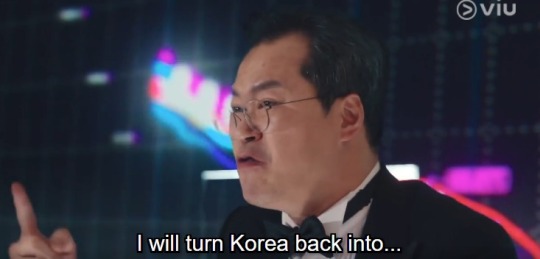


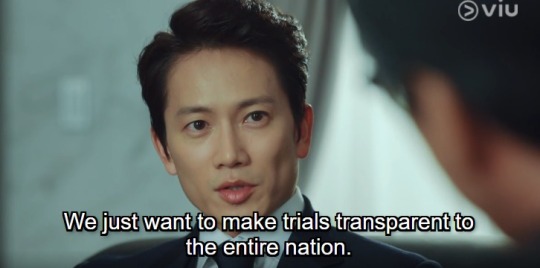

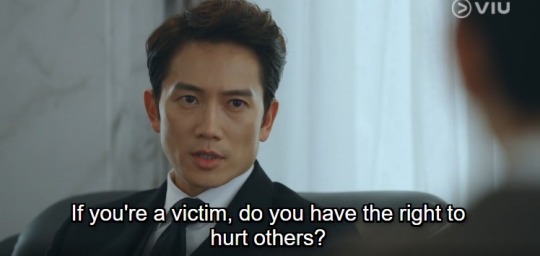


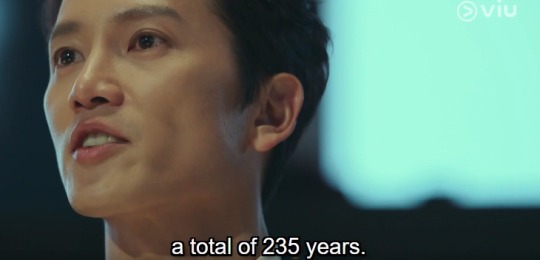
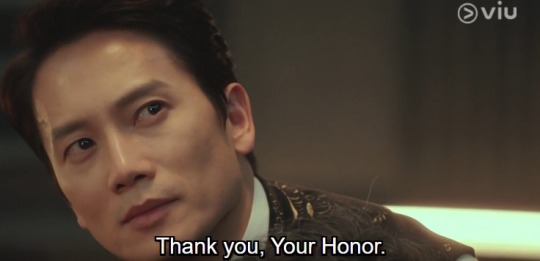
An uprising that created a dystopian Seoul gave birth to a monstrous judge and a live court trial setting.
The Devil Judge episode 1; A Monster Emerges
Episode 1 of The Devil Judge begins in a dystopian Seoul with chaos everywhere in the streets. There’s a unknown plague covering the entire country that made companies fallen and people homeless. The chaos which made the poor lead an arson and acts of terrorism. This created the Gwanghwamun riot and the Social Responsibility Foundation has send out a press conference.
The virus that created the monster
President Heo says a powerful speech. The economic troubles are part of the past. The plague will be forgotten as it’s been resolved by the government. While President Heo speaks this event, the important guests are being introduced: Seo Jeong Hak who is the Chairman of Social Responsibility Foundation, Cha Kyung Hee (Minister Of Justice), Min Yong Shik (Minbo Group Chairman) and Park Duman (Saram Media Chairman). The president also promises to create more jobs and to bring back Korea to the grand country as it was before. We also see on the screen how donations kept on rolling and another character was introduced. Jung Sun Ah (Executive Director of CSR Foundation) commented how the President overreacts whenever a camera is on his face. They know that he’s a clown and the attitude never goes away.
The president adds, they must rectify their law and order. He has passed a bill for a powerful judicial reform which allows the public to participate as jurors. Im not sure if that is such a good idea. Here comes Kang Yohan who is being introduced by the President as a ruthless judge. Judge Kang will preside over the trials and hands out sentences in a live television setting. Here comes the judge who exudes with much charisma and suave. Alot of concerned questions were raised like how the live broadcast is a anti-humanitarian act and it’s only for show. Another comment was mentioned that Judge Kang punishes too severely and are inconsiderate of the weak. Judge Kang interrupts and asks “Who’s weak?”. The journalist made a sample of the disadvantage but he retaliates that they are still the defendants. He mentions that he doesnt care if there’s a powerful person or not. Another journalist asked if he can hand down a hefty sentence on a defendant for the live show. A sample was made with Chairman Joo Il Do, who is known for being well connected. He then makes a statement saying “I am power!” and how he exercises the judicial power that was delegate to him and who is above him (the public). He then ends his speech which made many people impressed especially the President and the Minister of Justice. After the speech, Sun Ah congratulates him for the sexy power he has and the rest of the influential people stares at him.
Kim Gaon
We see another character who Kim Gaon using a public transportation watching the speech of Kang Yohan about to go to The Supreme Court. He then enters the office of Chief Justice Min Jungho who is apparently his former Professor. Gaon and Jungho discusses the live program which made Gaon question Yohan and his intentions. Jungho describes Yohan as no ordinary judge. He is a revolutionist who will eradicate court corruption. He is the nation’s only hope.This made Gaon realize that Yohan is extremely popular. As the riots dies down Jungho compares Yohan as a monster that emerges from turbulent times due to the absurb bills he keeps on passing. Yohan doesnt thinks more of a politician, politician for the people. Gaon realizes how Chief Jungho has a dislike with Yohan and asks why he wants him to be part of the live show. Jungho wants Gaon to observe Yohan and compares himself to Judas.
Gaon and Yohan finally meets at Yohan’s office. When Gaon left, Yohan opened his personal information file with a picture of his parents an a article title “We Just Wanted To Do A Good Deed”, “Conned Restaurant Owner Couple Kills Themselves”. He makes a comment on how he looks just like the father. I wonder if Yohan has met the parents before and if he has anything to do with them being dead.
Gaon enters to his office and we’re introduced with Oh Jinjoo (Associate Judge). They both introduced themselves and Jinjoo made a comment about Gaon’s smile. She mentions how he looks good when he smiles and realizes that there’s a criteria on picking judges base on their visuals. Being charming enough creates power.
Bus incident
As Gaon leaves, we see a group of young students crossing with their teacher. There’s also a incoming bus that is speeding and out of control and is about to enter the Supreme Court entrance. This prompts Gaon to be alert as he sees a young girl about to get hit and covers to protect her. While he does, Yohan was seen shooting the bus driver which made the bus topple. The bus is about to explode with the driver still in it. Gaon continues to be a good citizen and saves the driver on time. There’s a news coverage with the important members of the live show watching. The coverage mentions a arrest warrant for the chairman of JU Chemical Joo Il Do (who was at the presscon) was suspended and the kindergarten driver is connected as a act of protest. The Ministry of Justice says to the President that its a challenge to the authority but SongA responses and says its a outcry. CEO Joo created an incident leak of toxic waste water. Another comment was raised that the many of the public are still out of work and the government can’t collect taxes. If they dont solve this, another revolt would break out. They move on to the live show and asked the Saram Media Chairman how the process is doing. The president mentions that Yohan wanted to do this case personally and makes sure that it goes well.
Gaon sees Yohan leaving and thanks him for saving his life but comments on how Yohan didnt hesitate to shoot. He asked Yohan if he was going to kill the bus driver and Yohan answers back to Gaon with a response like “If i had to?!”. Gaon unsure with his intentions, Yohan counteracts and says if he didnt do anything the bus wouldve continued to spiraled straight. Gaon says that Yohan doesnt care if the bus driver dies or not and makes a calculation stating saving 2 is better than 1.
1st case preparation
There’s a meeting discussing what case they’ll do for the first live show. Yohan wants to take on the JU Chemical case as his first states that it’s a appropriate case and is confident that he’ll go by the law. Yohan makes it clear that its not the people’s court and just wants to make the trials transparent.
Chairman Joo and his lawyer discusses before the first trial. They talk about how hard it is to get clear evidence related to environmental issues. Since itll be difficult to find evidence they’ll plead not guilty. If things turned not well, the judge will charge them with professional negligence resulting death which will lead to 5 years imprisonment. Chairman Joo asks if he can trust the lawyer and says that he will.
Gaon and Jungho talks privately. Jungho asks why Yohan wants the toxic waste case to be his first. Gaon answers the obvious. Jungho also added that Chairman Joo is the biggest donator of the Social Responsibility Foundation. The reason why Yohan is there is because of the Foundation and the Ministry of Justice being his back support. Jungho thinks he has a ulterior motive, despite being in a awkward situation and yet still took the case. Ji Yoonsik and Yohan discusses the bus incident. Ji tells Yohan that he doesnt want to create a scandal and thinks the incident is carelessness but Yohan mentions that its noise marketing (since the incident is related to Chairman Joo). I assume that Yohan only cares for his status and following the law without caring how it affects others.
Gaon makes a comment that the 3 year old is a daughter of the bus driver is part of one of the many deceased related to the JU Chemical Case. The grandmother committed suicide over the case. Gaon internally looks frustrated after Yohan looks like he doesnt care. He says that Yohan rejected Chairman Joo’s warrant and yet want to incarcerate the bus driver. Yohan mentions that the bus driver was caught on the scene but Gaon talks back and says that they must take the motive into consideration. Yohan says that despite being a victim, does this give them a right to hurt others? Well you have to agree with Yohan on that one though. Gaon then mentions that the bus driver is injured and Yohan says that they have a medical detention center so the issue is solved which lead Gaon to become quiet. Do you think Gaon is putting his emotions over the law?
A news report about the incident broke out that the child named Yu died from the toxic waste water leakage incident of JU Chemical. The grandmother of the child committed suicide. The result of the incident led 11 dead, the rest of the alive victims are receiving treatment.
Gaon and Jungho ate out. Gaon made a private investigation on Cha Kyunghee. During the time Chairman Joo caused trouble as a startup business, Ms. Cha was the person who helped him as a elite Seoul prosecutor. To return the favor when Cha became a assembly woman Chairman Joo is the head of her campaign club. Jungho made a assumption that theyre both helping each other and since Yohan was forced to be part of it, he still wanted to put Joo on a trial. Cha is watching on the sidelines with no objection. What do you think are the intentions of Cha and Joo? It’s not for the good right? Its all speculations for now. They compared the scenario as someone’s first love. Gaon continues to spy on Yohan to find more evidence and puts in spy devices around his office. Yohan almost caught him as he entered the office. Gaon continues to spy and spots Chairman Joo’s lawyer about to enter a restaurant meeting Kang Yohan. Gaon and Jungho meets up after discussing the scenes which makes them even more suspicious over Yohan. They just need to watch him closely at court.
Gaon’s childhood
As Gaon comes home, we are introduced to Soohyun who is a RIT Lietenant who is a childhood friend of his. Soohyun compares the 2 of them and says how the public loves judges with different backgrounds. We learned that Gaon doesnt want to move out as the place reminds him of his parents. Gaon and Soohyun continues to joke around, Soohyun mentions that she has a crush on him but he had rejected her. Gaon didnt want to lose his only best friend.
While Soohyun was doing her rounds, Soohyun hears a woman screaming for help. A highschool student was being attacked on the streets and saves her. This makes Soohyun becoming a likeable character. Ironically a poster above with the caption “A safe Korea will be realized from now on.”. Not so safe yet isnt it?
Ms Jung and Ministry Of Justice meeting
Ms Jung starts the discussion stating that the sponsors are becoming worried with the upcoming trial. The reason why theyre holding the mock trial is to ease the citizen’s anger over criminals. Suspicious to why they put a businessman on trial and if he receives a serious punishment, itll become a negative precedent for the business people. Cha says a rhetorical question if Yohan has ever made a mistake, but he hasnt. Song still adamant and wants the case to be a lighter trial. Asks why Cha is adamant about this being the first case and also mentions that Ms Song has overstepped by being arrogant. Before Jung leaves she commented on how everything from the office to her expensive car was paid by her foundation. Damn, straight fire. I like her. She also adds statistics information that the Ministry of Justice lacks budget and added that her foundation should create more prisons themselves. OMG
The First Live Trial
Before the trial begins, Yohan begins to be reminded of his past with a shadow that looked like Gaon surrounded with fire.
How to watch the trial?
Install the DIKE app, tap the statue and you’re in! While watching the trial 2 buttons will appear: Red button - To be punished and otherwise they can tap the other button. Votes will be collected and visualized in court. The judge will be able to see the people’s opinions and decide easily.
The court case is about a chemical company who caused sewage leak and didnt do any treatment. The water was used by the residents for their daily lives.
Yohan comes a conclusion and decides that there was intent murder. Five years is the maximum. As mentioned during the beginning of the episode, Yohan became a monstrous judge by passing insane bills. One of the bills is about the number of years accumulated for the sentences, based on the victims. To make it more dramatic since its a live tv show, he lowered down the blinds and lights mentioning all the names of the victims. He also mentions that there were 11 dead and 36 disabilities. The case resulted from 5 to 235 years of imprisonment, which equates to a life sentence. Ministry Of Justice watching from behind the tv looked in shock. While Yohan mentions the names the President continues to watches and compliments how Yohan is a true master.
The trial resulted to professional negligence and 235 years of imprisonment. The ratings also were soaring high and the Ministry of Justice is pissed while the President smirks. Yohan speaks to Chairman Joo and wishes him a long life..
HAH.
The live trial ends and a victim’s relative thanks Judge Yohan. While the victim’s relative was crying and hugging Yohan, Yohan was seen yawning as if he was bored. Gaon saw it and continued to stare at him. Yohan stared back acting like a devil. We see a flashback of Yohan handing out a USB and mentions that there will be a flash of the victim’s pictures will be put out during the show. Yohan then smirks at Gaon. The scene fades with Yohan standing facing off with Gaon. A flashback of his tragic past shows him and a look-a-like Gaon (Yohan’s brother or a former colleague maybe) facing each other surrounded by which looks like a burnt old church. They both continued to stare at each other as the scene concludes. It looks like there’s a past which needs to be disclosed.
--
Comments:
+ Good acting (Ji Sung, Kim Minjung, Jang Youngnam)
+ Live trial setting
+ Buildups of the faceoffs: Yohan vs Gaon / Ms Jung vs Ms Cha
+ Buildups of the 1st case
+ Good suspenseful bgm
+Script looks full and engaging
- Dystopian setting looks poor production wise but is made up by the + cinematography
+/- Needs a 2nd rewatch for the pilot incase you miss something out
7/10 so far for the pilot. I look forward for the rivalries and the upcoming cases.
8 notes
·
View notes
Text
BullPerks
BullPerks - The fairest and most community dedicated decentralized VC and multi chain launchpad.

#bullperks #bsc #crypto
I'm Jadon Sancho here will explain more about the project Bullperks
About BullPerks
The Ultimate and most fair platform for retail buyers to get access to private sale allocations to the most sought after crypto projects just like crypto funds do
Who is behind this?
The BullPerks team and advisors have been around for a while and have over 20 years of combined crypto experience. Each member has managed tons of projects in the crypto space.
A mix of talented individuals at the top of their fields is here to build a unique skill set to have a fun and successful journey from crypto start-up ideation to execution.
What's unique about Bullperks?
The majority of decentralized VCs and launchpads have become private member clubs after their token price increased. With a set tier system based on the token amount you hold, only early investors have access to those tiers and share in the deals.
BullPerks, with its adaptive tier system, is the fairest and most community-dedicated platform giving access to early-stage deals.
BullPerks — The All-Inclusive Decentralized VC That Can’t be Tamed
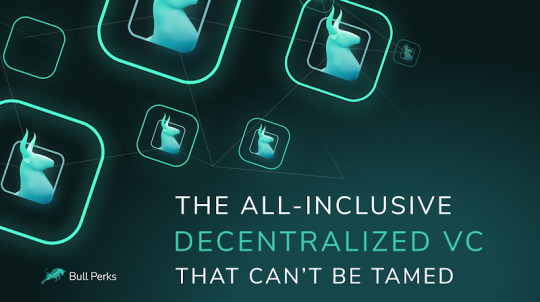
As a proud crypto bull, you know this is an exciting time to invest in a wide range of cutting-edge blockchain technologies that show great potential to revolutionize an industry or service. However, having access to those groundfloor investments with typical VCs presents its challenges because of the exclusivity that comes with getting in early. This results in missed opportunities and keeps you on the sidelines as great projects turn into great companies.
At BullPerks we intend to disrupt this pattern and provide stakeholders with even modest starting capital the chance to buy into projects they feel align with their vision of a healthy crypto/blockchain portfolio.
The Team Behind the Bull
The experts that make up our BullPerks team are entrepreneurs, advisors, investors, marketing professionals, and VC fundraisers. We are at the top of our respective fields with a long list of projects to their credit and over two decades of experience in the crypto space. The wealth of knowledge our team possesses allows for us to present you with projects that will bring new blockchain technology to the forefront of the business world.
Where To Get Started
Investors are encouraged to contact BullPerks through our website info page and join our Telegram group. It’s important to purchase BLP tokens and establish which allocation tier you fall into. This will also allow you to see which projects are available to you.
We also understand that from time to time, you may come across a project that does not resonate with you; and this leads to one of the many “perks’’ of joining Bullperks. Your investment is your choice, which means you have the freedom to buy into or pass on any project you see fit. You simply select the “pass” option on the BullPerks platform and you will maintain your place in the queue.
Support For Your Project
As a founder of a project, the BullPerks team will pool their extensive experience and resources to help raise funds, develop an effective marketing strategy, and advise you on a wide range of procedures and opportunities that may include potential partnerships with other successful projects.
What Sets Bullperks Apart?
BullPerks acts as a VC/fund that offers traders access to seed and private rounds which are otherwise known as “exclusive” allocations. It is well known that to partake in these types of investments, an individual or organization must have access to a high-profile network and must also provide very large sums of capital. Being able to participate in these types of exclusive sales is one of the most coveted opportunities in the crypto space and something typically far out of reach for the average joe.
Experience and Focus That Equals
The various skill sets of our team of crypto and blockchain experts help every project we bring to market reach its full potential. As a trader or project founder, you will have the support you need as you join a community of like-minded people with years of experience and a proven track record of success. Contact us at BullPerks today to get more information on how you can get started on our platform.
Tokenomics
300M total tokens BLP

Token sale
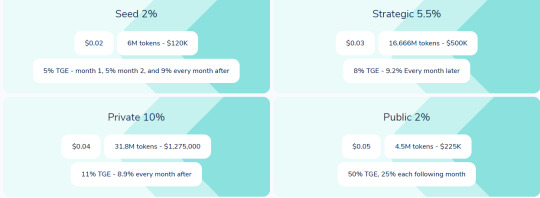
Total raise: $2,120,000
Team: 1 year cliff and then 8.33% per month
Advisors: 8 months cliff and then 8.33% per month
Initial market cap on TGE - Seed + Strategic + Private + Public at $0.05
7.389M tokens = $369.5K
Buyback Program
The 3% fees on investment will go fully to buy backs!
All the profits from the sales of the NFT store
Using 10% of the profits of the company investments
Our Investment model and tiers
There are other platforms that offer so-called investing like VС’s, however in all of those only if you join early you win and really get allocation for projects

We will have deals and allocations for each group or fair mixes
Silver Bulls will be guaranteed to get some allocations on some deals.
Per every 4 deals:

Leadership
Eran Elhanani: Co-Founder
Constantin Kogan: Co-Founder
Team
Dmitry Chirun
CTO
Seasoned CTO with over 20 years of creating and managing remote teams in a variety of industries. Master’s in cryptography. Building engineering teams from concept to delivery. Ex-VP of Wargaming, USGold, advisor to various crypto projects and accelerators.
Sheynel Smith
Compliance Officer/Money Laundering Reporting Officer (MLRO)
Managing Director of Driftwood Advisory Services. An experienced crypto compliance professional with a Master's of Law specializing in Financial Crime. She is certified as a Crypto Currency Investigator (CCI), Anti-Money Laundering Specialist (ACAMS) and Financial Crimes Specialist (ACFCS).
Alex Man
Head of Business Development & Partnerships
Partner at Jun Capital, serial entrepreneur, futurist. A digital assets specialist primarily focused on early stage emerging technologies, startups and revolutionary DLT projects. Alex helps companies get access to strategic capital and builds bridges between global partners.
Dima Doroshenko
Project Manager
Calculated and strategic decision maker with 10 years of proven leadership, communication skills and a relentless drive to exceed expectations.
Nikita Drozdov
UX/UI, Graphic Designer
An award-winning UI/UX designer with a core focus in FinTech.
Tina Kocharian
Content Manager
Technical content writer with experience in blockchain technology.
Advisors
Dr Deeban Ratneswaran
CEO and Founder GD10 Ventures
An award-winning academic, serial entrepreneur and international educationalist. As an early-stage blockchain investor, multinational VC advisor, Deeban has developed impressive investment achievements with a 25x portfolio growth between 2019 and 2021.
Josh Meier
Partner at Latitude Blockchain Services. Marketing Team & Strategic Advisor for multiple projects, including Splyt, StackOS, OMNI, Ally, EQIFI and others. Holds a Bachelor of Business Administration with a Major in Marketing and a Minor in Finance. Over 10 years of professional sales and marketing experience and 5 years of experience in blockchain technology.
Mike Miglio
Founder and managing partner of the esteemed American cryptocurrency law firm, Wolfe Miglio. Throughout his career, Mike has aided in successfully launching dozens of cryptocurrency projects. In 2020, Mike moved away from providing services as an attorney to found Bridge Mutual, a popular decentralized coverage platform that allows users to protect themselves from losses caused by hacks or exploits against cryptocurrency projects and exchanges.
Shane McQuillan
VC at Alphabit Fund, fundraiser and strategist, a seasoned professional with over 25 years of experience working with startups in all aspects and stages. Former Saxo Bank executive, Shane has been at the forefront of development through blockchain-based startups, co-founder of "TrustedIn Trading."
Jason Fang
Jason is a Founder and Managing Partner at Sora Ventures. Prior to Sora, Jason was the Head of Global Business Development at Juzix (now PlatON). Jason joined the blockchain industry in early 2016 as an Investment Associate at Fenbushi Capital, where he did deal flows and post management of North American companies.
Yida Gao
Founder of Shima Capital.
Former Bitcoin and Ethereum Investor, former VC Investor at New Enterprise Associates (NEA), 2020 Forbes 30 Under 30. Former M&A Investment Banker at Morgan Stanley, Former Consultant at McKinsey, M.B.A., Stanford Business School (dropped out). B.S. in Computer Science, Massachusetts Institute of Technology (MIT).
Ilia Maksimenka
CEO/Founder PlasmaPay
Ilia Maksimenka is a builder of Web 4.0, early-stage investor, DeFi engineer, founder, and financial architect of PlasmaDLT - blockchain for Decentralized Finance, Payments and Banks, and Spaceport.
Corey Billington
Director of Latitude Blockchain Services, Senior advisor of multiple projects, including AuBit, Splyt and StackOS. Has a professional background in business development, marketing and mechanical engineering.
Edna Yuan
Edna Yuan, Investor in 40+ project, including ANKR and Chiliz, incubated over 10 projects such as Findora, Channels, Oddz, Reef. Former Investment Fund Analysis Manager at Fidelity & Securities Trading Broker at TD Ameritrade.
Aylon Morley
Prolific investor in the blockchain space With more than 20 years of experience in the capital markets under his belt. Previously Tech Investment Director for Wentworth Hall, a London-based family office that specializes in private equity ventures and start-up investments. He is also a strategic partner in the SAVA Digital asset Fund. Advisor to Tezos and DuskNetwork.
For more information please follow the link below:
Website : https://bullperks.com/
Twitter : https://twitter.com/bullperks
Facebook: https://www.facebook.com/bullperks
Instagram: https://www.instagram.com/bullperks/
Linkedin: https://www.linkedin.com/company/77364631/admin/
Telegram : https://t.me/BullPerks_Official
Medium : https://medium.com/bull-perks
youtube : https://www.youtube.com/channel/UCIY2Vz-X3vmBLSqbMcPZyMQ
Author:
Forum Username: Jadon Sancho
Forum Profile Link: https://bitcointalk.org/index.php?action=profile;u=2954208
Telegram Username: @Jadonsancho09
BEP-20 Wallet Address: 0xb05fc25bCfa612Eaef1Fa17cEBF05A675a40D5e1
2 notes
·
View notes
Text
The world certainly loves to get my attention in interesting ways. More often than not, the methods used to do so are only a means to an end in order to piss me off, but this time I'm genuinely amused.
The most recent happening that has garnered my attention is the big stink going on with Hedge Fund concerning $GME and a handful of Redditors who bought the hell out of GameStop shares. A lot of people don't understand what this means or why so many of the wealthy and empowered are making a big deal out of it, but your ever helpful Uncle Fuck Off is here to educate you on things.
So let's start at the beginning. What is Hedge Fund? A Hedge Fund is an alternative investment that is designed to protect investment portfolios from market and certainty, while generating positive returns in both up and down markets. Hedge funds are financial partnerships that use pooled funds and employ different strategies to earn active returns for their investors. These funds may be managed aggressively or make use of derivatives and leverage to generate higher returns. Basically, it's a way for a select, limited number of very wealthy people to get even wealthier by buying stocks and trades at a low price, then waiting for the demand of these stocks and trades to go up in order to sell them at a higher price. Here's an example; Imagine a loaf of bread at any select store cost $2.00, and the supply is limited. Now imagine buying all that bread at $2.00 a loaf, completely emptying the county supply of bread. Then, directly afterwards, you turn around and start selling that bread at $3.50 a loaf, garnering a $1.50 profit.
It's kinda like that, but on a much, much larger scale, often resulting in the spending of millions/billions, and making a profit of half that after accounting for purchase.
So now that we've explained that, let's move on to the next chapter.
So what's going on with GameStop stock? Well so far, over the last 6 months, GameStop stock price has seen an 8000% increase, which is insane by any standards. The more complex answer is that it's stock has become a central gamepiece in a financial power struggle between a major hedge fund, Melvin Capital, and a group of amateur stock traders who yell on the internet.
So how is GameStop tied up in all of this? Well, Like many companies that are in rough shape, GameStop was the subject of what's called short selling, in which professional investors borrow shares of stocks to sell and then buy back later so they can return them, which lets them pocket the profit if the stock price goes down. They're basically bets that the company will fail. GameStop was one of the most shorted of all publicly traded companies. Other companies on the list include AMC Theaters, Bed Bath & Beyond and even the most defunct Blockbuster. And then GameStop became the source of a "Short Squeeze". I won't even get into explaining what a Short Squeeze is, it's a long and complicated subject. I'll just leave it at; A Short Squeeze means investors bought at a high price and bet the price would continue to fall, and when it didn't, they were left with millions in stocks that they had to sell at a much higher price.
Moving on, a handful of ametuer investors on the Reddit page r/wallstreetbets decided to throw 100% of their portfolios into $GME once they saw the shares rising, causing those who run WSB (r/wallstreetbets) to temporarily switch the community to private with the excuse that they were "Experiencing technical difficulties based on unprecedented scale as a result of the newfound interest in WSB.", which I think means the bean counters tried to intervene with us normal people making more money than we're supposed to.
This is where things get a little complicated and a bit more unclear. Shares in GameStop ticked up on January 11th after it named three people to its board of directors as part of a deal with shareholders who had been agitating for change. That caused some short sellers to abandon their positions, helping to drive the stock up more in the following days. The stock traded for about even for a few days, but things really began to change on the following Friday.
CNBC data showed that the volume of shares traded - a closely watched indicator of activity around the stock - spiked on Friday. Increased volume can indicate a short squeeze, meaning people who had bet against the stock either chose or were forced to give up and take losses. and while WSB had gotten some media attention in recent days for its GameStop boosterism, a boom in coverage of GameStop and WSB helped bring the story out of the financial world and more into the mainstream. GameStop shares would go from trading at around $43, already significantly more than it traded at the beginning of the year, to as much as $380, becoming one of the most traded stocks on the market along the way. This alone has Wallstreet shitting themselves, as it could potentially cost them tens of billions of dollars.
So how will the market be different if this continues? There is some belief that WSB signals the arrival of a powerful new force as large numbers of retail investors find influence by acting in concert or following one another into a big trade. That may serve as a check or balance on other large forces, such as hedge funds, which are used to throwing their weight around without ordinary investors affecting a price. As for how it couldn't affect us normal people, right now, the speculation activity is only around a few companies, which isn't that uncommon. But the broader concern comes when what are known as retail investors - amateurs buying stocks for their own personal gain - become overly exuberant and inflate stock prices, sometimes by taking out loans to buy shares. and some skeptics point to the situation around GameStop and other companies as evidence that the stock market has reached a dangerous level of enthusiasm and speculation.
n
Now, very often a short squeeze ends in a price falling back to where it was before the drama started. In 2008, when Volkswagen was in the middle of a trader tug of war, it briefly became the stock market's most valued company, but it's price settled down eventually. History suggests that no stock can go up forever, and over time, stock prices generally reflect the expected future earnings of corporations. But long shots can go on for extended periods if the players have enough resources to risk. Tesla, for example, would need 1,600 years of profits to justify its current price to earnings ratio, according to a calculation this last year.
So far, there's no evidence that any of this is illegal, although NASDAQ CEO Adena Friedman has said stock exchanges and regulators need to pay attention to the potential for schemes fueled by social media. While Reddit didn't answer questions this past Wednesday about whether it's in touch with regulators, it said it prohibits posting illegal content or facilitating illegal transactions. In a short statement, a Reddit official stated "We will review and cooperate with valid law enforcement investigations or actions as needed".
Of course I personally find this all to be bullshit. In my personal viewpoints, this is just another way for the very rich and wealthy to strongarm us normal people into being complacent, as they cannot make money off of us if we continue to make more and more money. Many investors and Wall Street members have stated that this could very well impact the fragile Trickle-down Economy, however, this again is absolute bullshit. Let me explain why.
Trickle down economy works exactly how it sounds, except it doesn't work at all. The long and short of it is investors and very wealthy people make a lot of money and they believe that eventually that money will make its way down to us normal and poorer people, however it never really does as most of the time, and in very, very many cases, these investors and wealthy people will more often than not square it away in a bank account or throw it back into stocks where they can make more money to put in their bank accounts. Trickle-down Economics only works the other way around, where us normal, poor people make money and buy stuff to put that money back into the economy where it will eventually make its way back to the wealthy making them far wealthier. Now I will agree that not all of that money goes back to the rich, but a good portion of it does. Most of the time that money will go back to paying employees, paying for equipment, and paying for materials used, but whatever else is left will go back to the rich. So you can see why this GameStop shit has Wall Street's panties in a twist.
Now, keep in mind that even if these amateur investors do win in this stock trade and cost Wall Street billions in US dollars, it is very unlikely that we of the current generation will see any of that money come back to us. The reality of the situation is that it would take years if not several decades for the money that Wall Street "loses" to circulate back to the normal person.
And that's what going on in this fucked up problem child of a country. Anyway, hopefully some of you actually paid attention to all of that, because I'm sick of explaining that the only side I'm on is my side. If you've got legitimate points that you'd like to make, I'd gladly listen to them and debate them, and I'll even concede defeat if I am wrong, but stop blowing up my inbox with half baked arguments because I have no patience to argue with someone who has little more intelligence than a water flea.
8 notes
·
View notes
Link
According to legend, the media is a pillar of democracy. The free press informs the public objectively, without bias, “just the facts, ma’am”. They staunchly champion freedom of speech; that’s their bread and butter! Their intrepid reporters expose high-level corruption, protecting the little guy from abuses by the wealthy and powerful.
Today’s reality is nearly the opposite. Worse, now they’re enthusiastically participating in censorship.
“Shut it down!”
Jason Koebler, a Vice editor for Motherboard (their technology column), posted “Deplatforming Works“, practically gloating about it.
It’s true that Silicon Valley’s lethargy on the far-right, aided by endless press coverage, helped amplify their message and turned the far right into a real, powerful political force in the United States.
So he believes that tech giants have been too slow in suppressing views that he doesn’t like. Still, he worries about what happens when they move to alternative platforms that respect freedom of expression. Further, he laments that censoring popular commentators generates publicity:
Deplatforming works “best” when the people being deplatformed don’t have any power to begin with.
That’s quite an unfiltered glimpse into the media mentality. He denies the censorship is ideologically motivated. Well, how often do leftists get banned for “extremist” opinions, criticizing groups they dislike, or controversial opinions about history?
The new Ministry of Truth
Another whopper, co-authored by Jason Koebler and Joseph Cox, described how journalists serve as social media tattletales:
In a recent interview at Facebook headquarters, one senior company employee told Motherboard that Facebook somewhat formalized the process of responding to content moderation-related inquiries from journalists, and has a dedicated system for ‘escalating’ issues highlighted by journalists. This often gets the content in front of those deciding whether to remove it or not more quickly than ordinary user-generated reports.
Thanks for the tip, dude. I’ve been wondering who’s been doing this sneaky behind-the-scenes stuff. As I’ve suspected, this goes much further than tricky “watchdog” outfits, or Social Justice Warriors orchestrating mobbing campaigns on Tumblr.
So he brazenly admitted that Lügenpresse employees are colluding with social media companies, ratting out content which they think the public shouldn’t be allowed to see. (Is that what college journalism departments teach kids these days?) Since the tech giants in cahoots with them created special pipelines to expedite the snitching, apparently this happens pretty frequently.
Last month, when explaining why Twitter hadn’t initially banned InfoWars from its platform, CEO Jack Dorsey said “it’s critical journalists document, validate and refute [dis]information directly so people can form their own opinions. This is what serves the public conversation best.”
Given the MSM’s track record of bias, distortion, and outright lies, their new side job of censoring dissident viewpoints is like a fox guarding the henhouse. (Jack Dorsey’s statement is almost as much of a whopper as when Barbara Spectre said, “But without that leading role, and without that transformation [to multiculturalism], Europe will not survive.”) It gets more nauseating yet:
Wednesday, at a Senate Intelligence Committee hearing, Dorsey again noted the role that journalists play in counteracting disinformation that spreads and is incentivized on his platform.
“We have this amazing constituency of journalists globally using our service every single day, and they often with a high degree of velocity call out unfactual information,” Dorsey said.
Senate Intelligence Committee—well, isn’t that special? If this “amazing constituency” is up to this daily, is all that really topical investigative research, or more like cyber-loafing?
Guarding the echo chamber
Journolist closed after this secret back channel was exposed. Is there anything else like that going on now?
Although that article seems unconcerned about ethics or freedom of speech, it correctly explains that tattling about social media posts for Silicon Valley billionaires isn’t the job they’re supposed to be doing. Journalists are paid to write stories. I’ll add that if they’re acting like Glavlit informers while on the clock, they’re stealing from their companies, just like if they’re playing Warcrack.
To be clear, every platform has moderators or algorithms which catch the vast majority of content violations on a platform. But still, many of the highest-profile content moderation decisions seem to be made only after there’s publicity around them. For example, InfoWars was only banned from platforms after a steady drumbeat of reporting surrounding the disinformation and hate speech spread by Alex Jones.
Jones got banned from four major platforms simultaneously. Anyone who believes the timing was a coincidence probably believes in the Easter Bunny too. Are the esteemed members of the Fourth Estate still using transmission belts hidden from the public like Journolist?
Here’s how it rolls at their own company:
At Motherboard, we’ve increasingly decided to withhold specific examples from tech companies when approaching them for an article. Of course, if they really need an example in order to have enough context to comment—if it’s a single specific video for instance—it would probably be best to provide a link to the clip. And we will give them enough context about what the videos are and the issue so they can write a statement explaining why they believe the content should or shouldn’t be removed. But for more general issues, or especially public material that can be found with a simple search, the companies don’t need hand holding to find the videos: indeed, the point is that they could have—and perhaps should have—come across them easily in the first place.
Finally:
Facebook also told Motherboard many other reporters have stopped sharing links to specific pieces of content until after the stories are published. Facebook believes it is beneficial to everyone if the company is able to remove violating content as quickly as possible.
So their take seems essentially like this:
Journalists are getting sick of working so hard at performing censorship for other companies, instead of doing their real jobs.
They wish the tech giants would make better programs to delete politically incorrect content robotically.
If they write a clickbait article about it, they’re disappointed that the content gets banned first.
It’s little wonder why people don’t trust the Lügenpresse. Even most liberals today realize the MSM is bullshit!
Why dissident views are important
Media outlets do have ideological positions. That’s understood, so long as long as that stuff stays in the op-eds and news is unbiased. According to legend, diversity of opinion throughout the media will allow the public to sort things out for themselves. However, 90% of the USA’s media outlets are owned by six gigantic conglomerates. Five are little more than propaganda factories for cultural Marxism. The one essentially representing the controlled opposition doesn’t stray too far from prevailing orthodoxy, or touch many vital topics.
The MSM is an oligopoly with vast powers to shape opinion. Therefore, dissident voices free of interference are the only ones breaking the information blockade. It’s the “deplorables” who now are looking out for the public, calling out subversion sometimes rising to treasonable levels when nobody else dares call it treason.
Finally, Jason Koebler has written several articles about data mining misuses. That much is admirable. Ironically, the MSM overlooks another problem with tech giants abusing monopolistic powers, often even assisting them. Not only do huge social media companies get a free pass for censorship, some journalists merely wish there was more of it so they can quit doing free work for them.
Don’t miss Beau’s book catalog. Good stuff!
2 notes
·
View notes
Link
excerpt-
“But according to four current OAN employees, including three anchors, and two former OAN producers, most of the journalists they know at the network’s headquarters consider themselves liberal. For some, taking a job at the national network was a way to leapfrog small regional broadcast jobs—a Faustian bargain they say leads to high turnover in the newsroom.
“I’ve worked on every shift now (morning, afternoon and & overnight) and can objectively say there is only one or two hardcore conservatives” in the newsroom, said one anchor via text. (The anchor’s analysis didn’t include evening opinion hosts.)
This dynamic is, according to several of the employees I spoke to, leading to tensions inside the newsroom as OAN makes headlines for its controversial coverage of coronavirus and the anti-racist protests. They said that in recent weeks they have felt everything from “horrified” to “defeated” at their own network’s reporting on the protests and are concerned that the management is pushing them toward increasingly conservative coverage angles. These employees said they feel pressured to cover angles that will protect network founder and CEO Robert Herring’s business investments”
how about a mass walkout?
1 note
·
View note
Photo
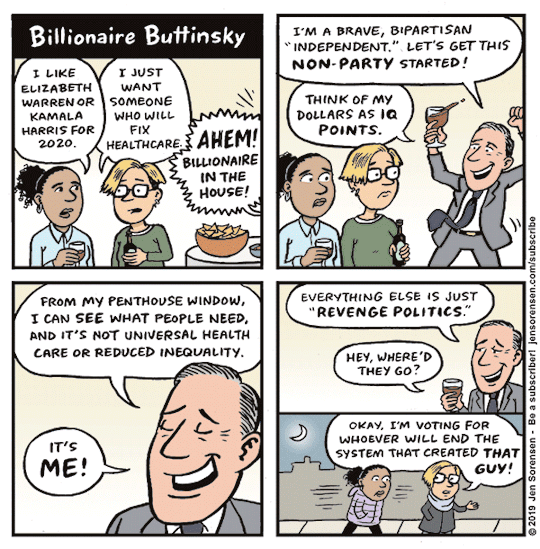
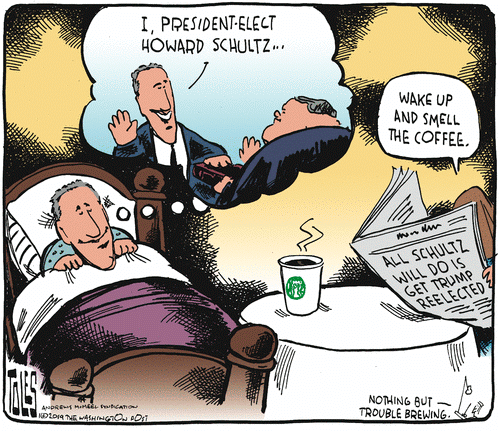

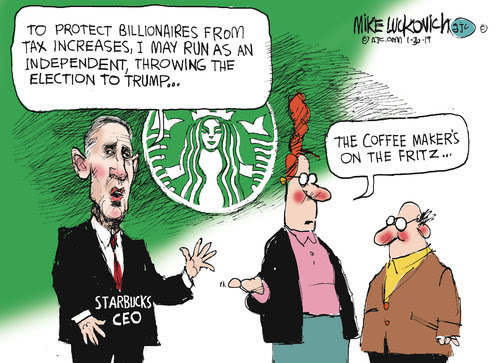
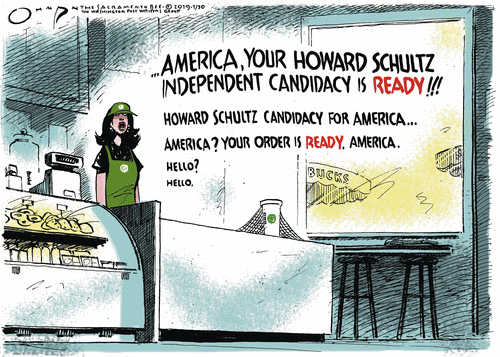
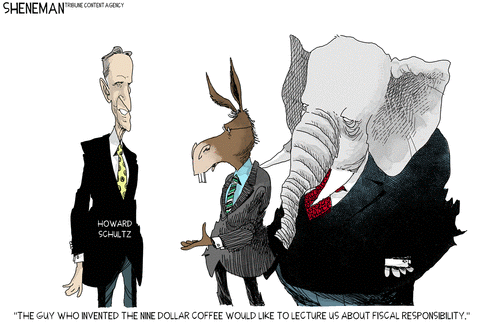
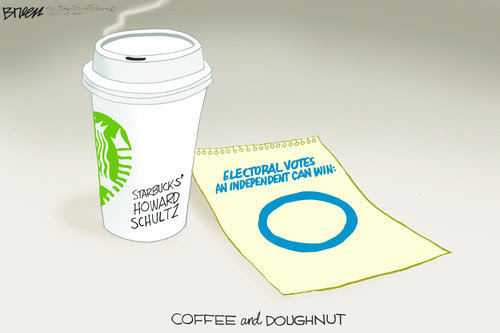
A few days ago I got an email from Barnes and Noble touting the latest releases, and right at the top was a book by a guy I’ve never heard of: Howard Schultz. When I read the description I learned he was the former CEO of Starbucks and he was writing about... I forget what the book is supposed to be about, but from the description I got the impression of a politician releasing a ‘Here’s where the country is at and here’s what we need to do to make it better’ tome.
“Is this guy running for president?” I asked myself half-seriously.
The next day I learned that yes, he is running for president. In his own mind at least. Hence the book.
I’m old enough to remember Ross Perot being taken seriously as a presidential candidate in ‘92 and to a lesser extent in ‘96. I don’t remember anything about his platform, which perhaps doesn’t matter. American media and culture love to swoon over millionaires and billionaires as inherently more driven, more competent and just all-around better than regular people, so whenever one of them makes noise about running for high office (leapfrogging a years- or decades-long career in politics, establishing themselves as knowledgeable of and experienced in the realms of campaigning, legislation and all the other stuff politicians do and just shooting right for a Senate seat or the presidency itself) the media dutifully gives them mountains of free press and treats them as a viable candidate because they think oodles of money is a reasonable substitute for experience or a clear platform or, in the case of Schultz, basic name recognition.
Now, obviously Schultz can take care of that last problem with his money. He can buy so much ad space in every form of media that we’ll all be drowning in ‘Schultz’s name is even more omnipresent than Starbucks locations’ ‘jokes.’ And the media isn’t going to pretend that a coherent political philosophy is something a billionaire needs when running for office. That’s for the paupers, who have to do things like fundraising and phone banking to keep their campaign going. ‘Tut-tut,’ they’ll say, ‘He’s a billionaire. Clearly he must know what the country needs and how to achieve it politically. Just hand the reins of government over to him and trust him.'
(And even if Schultz reveals himself to a be a racist, misogynistic, xenophobic buffoon the media will still give him coverage under the logic that he’s so popular so we have to give him more attention than the other candidates, thereby ensuring his popularity and the further normalization of whatever shit he spews.)
So it is incredibly gratifying to see that in at least one realm of the media, editorial cartoons, there are a number of people who aren’t having this shit. Maybe Trump finally broke the mold of ‘Billionaires with no political experience should be treated as viable candidates on faith alone’ or maybe even the current climate is taking note of income inequality for realsies now and a wealthy white guy all but saying ‘I don’t want to pay higher taxes, and if no one else will run against Warren (and Sanders, should events unfold that way) then I will, because someone has to protect my billions’ is not treated as a reasonable or unexceptional thing.
Probably not that second point, but please just let me have my dream of a world where the masses are aware of and openly admit that you don’t become and stay rich by being honest or decent, and any billionaire trying to jump into public service is going to be looked at with suspicion.
It’s a nice dream...
Anyway, I’m gratified to see I’m not the only one pegging Schultz as a self-serving schmuck with no chance of winning the presidency. Maybe there’ve been other times in the past where a millionaire/billionaire played at running for president, got a splash of free press, and then fizzled out or just walked away because they weren’t serious in the first place, and nobody else took them seriously, maybe even some people made fun of them, and I’ve just forgotten about it. Maybe there’s a cycle to this that I’ve never noticed because guys like Schultz are always just a flash in the pan not worth remembering.
Not everyone gets it, though. But could somebody (assuming anyone read through this entire post, in which case thank you) explain to me what appeal Schultz is supposed to have for Democrats?
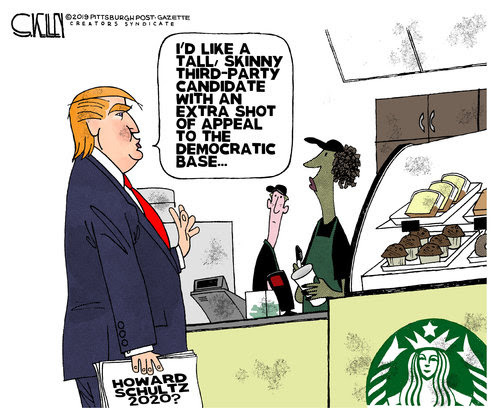
#Jen Sorenson#Tom Toles#Matt Bors#Mike Luckovich#Jack Ohman#Drew Sheneman#Steve Breen#Steve Kelley#Howard Schultz#Starbucks#Donald Trump#Donald Drumpf#2020 election
40 notes
·
View notes
Text
5 Times You Absolutely Need a Business Lawyer

As a small business owner, you know that the decisions you make can have a big impact on your future. Whether you're hiring employees or getting sued by a customer, having a lawyer on hand is invaluable when it comes to protecting yourself and your business. Here are five times when having a business lawyer will help:
Creating A Business Plan
A business plan is a document that lays out the details of your company, including its goals and objectives. It should be comprehensive enough to include all aspects of your startup: from the products and services you'll offer, to how much money you hope to generate each year, to how many people will work for you (and how many will come from outside).
A good business plan can help guide decisions about where to locate the company headquarters as well as other important considerations like hiring employees or buying equipment. By creating one now—and regularly updating it—you'll avoid falling into common pitfalls later on when it's already too late!
Forming A Partnership
You might need a business lawyer while forming a partnership. This is because a business lawyer can help you draft a partnership agreement. A partnership agreement is a contract between partners that sets out the rules of the partnership, such as how decisions will be made, how profits and losses will be shared, and what will happen if one partner wants to leave the partnership.
A business lawyer can also help you choose the right business structure for your partnership. There are three main types of business structures: sole proprietorships, partnerships, and corporations. Each type has its own advantages and disadvantages. For example, sole proprietorships are the simplest and most common type of business structure, but they offer the least amount of protection for the owner's personal assets. Partnerships offer more protection than sole proprietorships, but they are more complex and may require more paperwork.
Filing For Incorporation (Or Other Business Structure)
You may be wondering what exactly is a business structure and why you need a lawyer for incorporation. A business structure refers to the legal entity through which you will operate your business. There are three main types of businesses: sole proprietorship, partnership, and corporation (also known as C-corp).
A sole proprietorship is a personal legal entity owned by one person who uses the name “John Smith” or “Smith Company” in their name on any official documents related to their company. This means that if you own a farm or other property under this type of structure, it will not be seen as an independent business unless someone else owns shares in it with you; otherwise, there would be no reason for them to be able to claim ownership over anything because they don't really exist outside themselves!
Hiring Employees
Employee handbooks and employment contracts are two things that you should be sure to have in place before hiring any employees. The importance of these documents cannot be overstated, especially when it comes to avoiding discrimination lawsuits.
Employment contracts typically include the following information:
The company's name and address
A description of your role with the company (e.g., CEO)
Compensation details for both sides (salary/bonuses/benefits)
The contract also states what type of health insurance coverage will be provided by you as well as how much paid time off will be given per year (which can include sick days). It also outlines other benefits like life insurance policies, retirement plans, and 401K accounts where applicable
Getting Sued By A Customer Or Vendor.
If you are sued by a customer or vendor, you will likely need a business lawyer to help you navigate the legal system and protect your interests. There are many different types of lawsuits that businesses can be involved in, from breach of contract to fraud. A business lawyer can help you understand the specific details of your case and what the best course of action may be.
In some cases, it may be possible to settle a lawsuit without going to court. However, if the other party is unwilling to negotiate or if the case is complex, you will likely need to go through the legal process in order to get a fair resolution.
You Should Have A Lawyer On Hand When Important Decisions Are Made.
A business lawyer can help you avoid costly mistakes. The legal profession is in the business of helping people make good decisions, and they know how to do that by taking into account all of the relevant facts, laws, and regulations.
A good lawyer will explain how your business works and its strengths and weaknesses so that you can be sure it's operating legally—and if not, they will help guide you through the complicated process of correcting any problems with your company's structure or operations.
So, should you hire a lawyer? The answer is yes. But not just any lawyer—you want one with experience in your particular industry and business type, who can help you navigate the legal system and avoid pitfalls along the way.
1 note
·
View note
Link
Earlier this month, Twitter’s Jack Dorsey, Facebook’s Sheryl Sandberg, and an absent Google representative found themselves before the Senate Intelligence Committee (SIC), where they endured an uncomfortable grilling on topics ranging from the manipulation and value of user data to how one might police the “truth.” These lines of questioning inevitably generated vague speculation about regulation, though it’s difficult to imagine the scope of federal action that would be required in a serious effort to confront the crisis unfolding on the backs of privatized platforms.
It’s popular to refer to digital platforms as town squares, but the shopping mall is a more apt metaphor: they are built to approximate the participatory feel of an open market, while their corridors are ruthlessly designed for the purposes of encouraging consumption and maximizing profit. Depression, anxiety, hate-mongering, fear, and conspiratorial untruths are all acceptable outcomes so long as they are expressed, consciously or otherwise, in the service of growth.
Social media’s monarchs are more entrenched than ever. Still, its horizons remain murky.
These platform structures are, more and more, the dominant modes of abstract social organization: Amazon, Apple, Facebook, and Google have a combined market capitalization larger than the French GDP, and in an earlier hearing, Mark Zuckerberg struggled to name a single serious competitor when pressed on his company’s monopoly status. It’s clear that platform capitalism thrives at the expense of public discourse, and that its monarchs are more entrenched than ever. Still, its horizons remain murky.
The loudest, most frequent response to the crisis of platform consolidation has arguably been an appeal to better markets, such as the progressive coalition Freedom from Facebook’s effort to push the Federal Trade Commission to spin Instagram, WhatsApp, and Messenger into competing services. Law professor and New York Times contributor Tim Wu has similarly advanced this line, advocating for an aggressive antitrust campaign against the likes of Google and Amazon—including in his forthcoming book, The Curse of Bigness. If we break up the giants, the thinking goes, their progeny will improve each other in a rush to pan for attention. “We live in America,” he recently told The Vergecast, “which has a strong and proud tradition of breaking up companies that are too big for inefficient reasons.”
It’s hard to justify Facebook’s acquisitions of WhatsApp and Instagram as anything short of stabs at monopoly, but there are hard limits to antitrust—namely, that large platforms appeal to users precisely because of the network effects of intense consolidation. Smaller services routinely compete for attention-time, but typically do so by differentiating themselves and courting niche audiences rather than taking the behemoths head-on. Nobody thinks of Etsy as a replacement for Amazon, and not even Google+ could effectively compete as a direct replacement for Facebook. Unless it’s billed a subcultural phenomenon, people don’t see the point in adapting to a new platform until it reaches a critical mass—even though they’re the exact people it would need to get there.
Mastodon is a perfect example of the limits of platform competition. Optimistically billed as a community-focused Twitter-killer, the fledgling social network rode last month’s controversies into a gauntlet of fawning coverage that dared users to climb out of the Nazi-infested swamp. Mastodon is relatively free of hate speech and malicious bots, but few people made the leap: an unofficial bot currently reports around 230,000 users. This is partially due to individual preference for the familiar, but structural inertia presents a much stronger obstacle. Like any newcomer, Mastodon necessarily lacks the abundance of celebrities, journalists, and unhinged presidential proclamations that give Twitter the feel of a micro-celebritized commons. In a piece hailing the platform’s design strength, Wired editor Brendan Nystedt acknowledged its central deficiency in a bold understatement: “The only thing I truly miss from the old birdsite? My friends!” This isn’t a bug; it’s the exact reason we can’t look to a Mastodon, or an Ello, or a Gab for salvation—any more than libertarian seasteads can expect to cure traffic or gentrification. We need to make our platforms better, not wait for better platforms.
Given that these services often take the form of natural monopolies, others have suggested that, rather than break up the big platforms, we should subject them to stringent federal regulation as public utilities—or, as Platform Capitalism author Nick Srnicek has suggested, outright nationalization. But most digital platforms are transnational entities, meaning that regulatory efforts are narrowly limited to individual protections on the basis of citizenship (as we have seen with the EU’s General Data Protection Regulation). Otherwise, there are devastating implications for nationalization beyond our borders. Would a situation where the United States unilaterally dictates the policies of a platform shaping Paraguayan political discourse be any better than one in which Russian oligarchs are free to transmute capital into American speech?
If we’re to imagine a meaningful path for Congress to take, it’s worth considering the context of the recent SIC hearing. The previous month, conspiracy news site Infowars was systematically cut from Apple, Spotify, Facebook, YouTube, and a host of other platforms (Twitter followed suit after Alex Jones went on a Periscope rampage and berated its CEO at the hearing itself). The ensuing conversation was predictably frustrating, but enlightening insofar as it revealed how people conceptualize digital platforms. Ostensibly right-wing Infowars journalist Millie Weaver, for example, argued that Facebook has no right to ban private individuals, on the grounds that it is “public” rather than “privately owned.”
(Continue Reading)
#politics#the left#the baffler#capitalism#silicon valley#monopolies#facebook#Twitter#google#nationalization#democratic socialism#progressive#progressive movement
11 notes
·
View notes
Text
5 reasons why everyone should buy a term insurance plan

People are gradually understanding how important having life insurance is across society. Every family needs a life insurance policy to help them deal with the loss of a loved one, at least financially, as life is getting faster and more uncertain by the day. Providers are developing plans that address the diverse needs of different people in order to fulfill the rising demand for life insurance. This is the reason why selecting the best plan in such a complicated market can sometimes seem challenging. A term life insurance plan is the best option for the general public if you want to keep things simple.
A term life insurance policy the simplest type of life insurance, a term life insurance plan pays out benefits in the case the insured dies while the policy is still in force. A term life insurance plan is what you need to get if you want to live comfortably without worrying about the future and financial security of your family
Reasons why everyone should buy a term insurance plan
Easiest-to-understand plan
Compared to an endowment plan or an Ulip, for example, term plans are easy to understand and use. Simply pay the premium, and a set amount will be protected for your life. The life insurance policy with the simplest solution is term insurance. It only provides the sum specified in the policy's cover for the insured's life. According to Ashish Kapoor, CEO of Invest Shoppe India Ltd., the policy makes it simple to find out how many years the risk cover will be in effect as well as the premium due and other terms and conditions.
Income Tax Benefits
Under Section 80C of the Income Tax Act of 1961, you may deduct up to Rs 150,000 annually for premium payments. Additionally, Section 10 (10D) of the Income Tax Act of 1961 excludes from taxation the death benefit granted to your nominee (in the case of your sudden death).
Provides larger cover
Term insurance plans also offer better life coverage for the same premium as other insurance policies. This benefit allows it for everyone to obtain suitable life insurance, both for themselves and their loved ones. The premium is also quite reasonable, which is the best part.
Fixed premium
The insurance company will never modify or vary the premium during the duration of the policy once it has approved your policy in exchange for a specific premium. You may therefore be sure that you will always pay a certain amount each year without any modifications. As per current tax laws, taxes are due on the premium.
Financial Stability
This is the ultimate reason for choosing insurance of any kind, and it is a good one. The lives of the surviving family members can become totally unpredictable if the family's main income or any other paying member passes away. Managing household finances and providing for the family's basic requirements becomes an incredibly challenging task in such a circumstance. Even though it may be financially difficult, term life insurance offers the whole sum assured at the time of death and can simplify the lives of the surviving family members.
0 notes
Text
3 Ways to Improve Your CEO Branding
CEO Branding is a growing area of academic research focused on CEOs and their impact on organizations. The growing body of literature has explored how CEOs influence organizations and their reputations. But how can a CEO best market himself? And what are the best ways to build an authentic ceo brand? Let's find out! Listed below are 3 ways to improve your ceo branding. To start with, be authentic and consistent with your brand image.
Building a personal CEO Branding
Building a personal brand is not something that you can do overnight. It's a long-term commitment and requires sustained effort. People only remember a brand after several impressions. According to CareerBuilder, over half of employers will not hire candidates with no online presence. There are some tips and tricks to create an online presence that's worthy of your time. Here are some of them. But first, understand the basics of personal branding.
A CEO's personal brand is made up of three elements: his identity, his value, and the emotional response he or she generates with customers. To create a successful personal brand, a CEO must evoke strong emotions in customers that make them want to act on that information. For example, Steve Jobs' new product presentations triggered immediate sales. People expected quality from Steve Jobs, and that was because of their personal brand. Unfortunately, Tim Cook's personal brand doesn't inspire the same excitement.
CEO branding is a critical aspect of a CEO's career. It demonstrates their unique skill sets, unique perspectives, and objectives. CEO branding can also be influential in influencing industry change. By showcasing their expertise and achievements, CEOs can position themselves as leaders of change, and encourage other CEOs to follow in their footsteps. The importance of personal branding can't be underestimated. The following are a few tips for showcasing your unique value as a CEO.
Reputation management in ceo branding
Reputation management in CEO branding is an important component of your overall business strategy. CEOs are high-profile targets and a negative image can impact sales by 80%. The best way to combat negative media coverage is to use suppression and search engine optimization, or ORM. An effective ORM campaign will protect your brand from damaging press coverage by suppressing bad news, and improving your personal and brand image at the same time.
In addition to public relations, CEO branding should include personal brand development. The CEO's personal brand will play a large role in how consumers perceive the company. According to Forrester Consulting, 74% of customers tie the perception of a brand directly to its CEO. This makes CEO reputation management all the more important. If a CEO fails to develop consumer trust, it will be difficult to sell the company's products.
An online reputation can be easily damaged by malicious remarks and reviews. Unfortunately, these can be posted by employees, investors, or customers themselves. While loyal customers can usually overlook a stumble, negative press is an opportunity for further damage. This is why reputation management is an essential component of CEO branding. There are a number of benefits that come with it. But the bottom line is that it is imperative to do everything possible to protect your brand and reputation.
Authenticity in ceo branding
In an increasingly competitive market, authenticity is vital. The authenticity of a company is vital to building a loyal following and a brand that people can relate to. According to a Cohn & Wolfe study, authentic companies have three characteristics that customers find most appealing: reliability, respect, and reality. Businesses that display these qualities will succeed in a competitive market. If authenticity is a priority for your company, the following strategies will help you differentiate yourself from your competitors.
Authenticity is a critical element of a successful CEO brand. The most highly respected CEOs share several common personality traits. They are intelligent, passionate, and humble. But CEOs who exaggerate their confidence can harm a company's and their own reputations. Authentic leaders are more memorable and likable because they demonstrate their personal brand values in their own way. They also appear more human. This helps them to build trust and respect within their organizations.
Keeping a consistent brand image is a key to authenticity in marketing. If your company is consistently transparent and reflects the values of your brand, customers are more likely to trust you. However, if the company doesn't follow this rule, authenticity will become problematic. Companies should create a brand manifesto to guide their marketing efforts. The manifesto can also guide employees when they represent the brand. If it's not, it's time to reconsider your CEO branding strategy.
0 notes